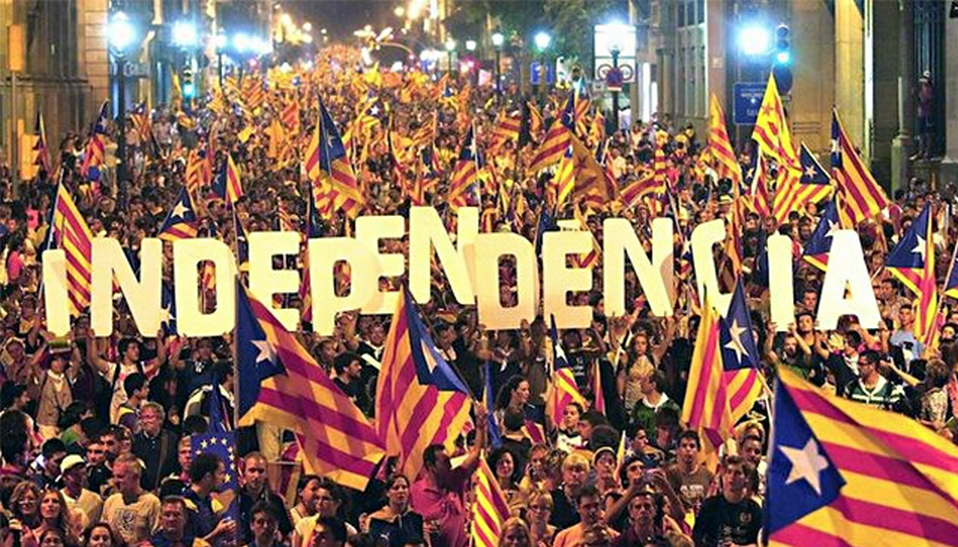Catalonia is situated on the northeastern side of Spain with Barcelona as its capital, with a population of approximately 7.5 million. Spain has been highly fortunate to ensure national unity throughout its history despite of linguistic and ethnic diversification. Catalonia’s independence can therefore prove to be highly destructive for the national unity of Spain and for the interests of U.S.A, Europe and even Catalonia itself, according to some critics.
A Catalonian Kingdom has never existed; rather Catalonia has always remained a part of a bigger kingdom called ‘The Kingdom of Aragon’. However, the Catalonian language and identity has existed throughout Spanish history. For hundreds of years the idea of Catalonia’s independence has been on the cards, but Catalonian leaders have always deemed it proper to establish and maintain sound relationships with the governments at the national level. Mr. Arthur Mas, President of Catalonia and leader of one of the nationalist parties of Catalonia’s regional parliament, was an adherent to the national government a few years back, but after the public’s demand for independence he has become a campaigner for the ‘yes’-movement.
The residents of Catalonia have an uneasy relationship with Spain. Without any doubt, the modern state of identification with Catalan culture and language is a response to Franco’s repressive rule over Catalonians decades ago. Current Catalonian politicians and two previous generations have grown up in this repressed Catalan environment, which has affected their way of thinking about independence. Furthermore, school curriculums have unveiled the horrifying history of Catalonia that consists of how Franco suppressed the Catalonians during the civil war. Moreover, political and economic turmoil in Spain has paved way for enthusiasts, like Mr. Artur Mas, who are ready to burn the midnight oil to secure Catalonia’s independence despite setbacks.
Catalonia’s independence is not an easy process as there are several blockades in its way. One of the major reasons is corruption. The mentor of Artur Mas, Pujol, was involved in a corruption scandal. As a result, the promise to the general public of clean and fair politicians is under threat. Additionally, a huge proportion of the Catalan population prefer Spanish as their mother tongue, in contrast to a minority, who still speak Catalan. If Catalonia secures independence, the Spanish speakers might not appreciate the change and consider migration to Spain. Another setback for the ‘yes’-movement is that the political parties of Spain have not advocated Catalonian independence. There has been no Spanish Prime Minister, in decades, who has raised a voice for independence. The central government supports Spanish national unity.
Recent polls have revealed a widening gap between ‘yes’ and ‘no’ voters. Polls stated before the referendum that 50% of the population would vote ‘no’ whereas 43% would vote a ‘yes’. This reminds us of the Scottish referendum in 2014, in which 55% Scots voted ‘no’ and 45% voted ‘yes’. A few weeks before the Scottish referendum, it was believed that the ‘yes’ vote would win, but the results turned to ‘no’. Therefore, independence movements are not easy.
As the most indebted region of Spain, Catalonia has already acquired several bailouts from the national government even though this region has a 20% GNP share in Spain’s national account and injects more taxes into Spanish economy in contrast to the revenue it shares. Even if Catalonia secures its independence from Spain, it would have to face a major part of Spanish debt, which it would need to pay in the future. Furthermore, the hunt for a new currency would not be easy, as Spain has the authority to veto Catalonia’s membership in the European Monetary Union. Deprivation from NATO’s membership might prove to be another nail in the coffin if luck does not favour Catalonia.
To achieve Catalonia’s independence, Arthur Mas and his team have to prove how the ‘yes’-movement can bring prosperity in people’s lives and how all the hazardous consequences can be dealt with. Patriotic assertions alone cannot convince the majority of the people to support this movement.
By Ali Zain Bhatti

